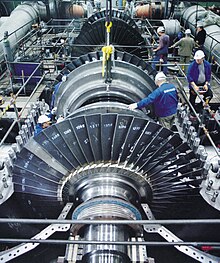Difference between revisions of "What things are different between science and engineering?"
imported>SeoGaLam (Created page with "<p><span style="font-size:20px"><strong>Engineering</strong></span></p> <hr /> <p><strong> Engineering</strong> is the creative application of science, mathematical me...") |
imported>SeoGaLam |
||
| Line 18: | Line 18: | ||
<p>Design of a <a href="https://en.wikipedia.org/wiki/Turbine" title="Turbine">turbine</a> requires collaboration of engineers from many fields, as the system involves mechanical, electro-magnetic and chemical processes. The <a href="https://en.wikipedia.org/wiki/Turbine_blade" title="Turbine blade">blades</a>, <a href="https://en.wikipedia.org/wiki/Stator" title="Stator">rotor and stator</a> as well as the <a href="https://en.wikipedia.org/wiki/Steam_cycle" title="Steam cycle">steam cycle</a>all need to be carefully designed and optimized.</p> | <p>Design of a <a href="https://en.wikipedia.org/wiki/Turbine" title="Turbine">turbine</a> requires collaboration of engineers from many fields, as the system involves mechanical, electro-magnetic and chemical processes. The <a href="https://en.wikipedia.org/wiki/Turbine_blade" title="Turbine blade">blades</a>, <a href="https://en.wikipedia.org/wiki/Stator" title="Stator">rotor and stator</a> as well as the <a href="https://en.wikipedia.org/wiki/Steam_cycle" title="Steam cycle">steam cycle</a>all need to be carefully designed and optimized.</p> | ||
| + | |||
| + | <p> </p> | ||
<p><span style="font-size:20px"><strong>Science</strong></span></p> | <p><span style="font-size:20px"><strong>Science</strong></span></p> | ||
Latest revision as of 00:51, 7 December 2018
Engineering
Engineering is the creative application of science, mathematical methods, and empirical evidence to the innovation, design, construction, operation and maintenance of structures, machines, materials, devices, systems, processes, and organizations for the benefit of humankind. The discipline of engineering encompasses a broad range of more specialized fields of engineering, each with a more specific emphasis on particular areas of applied mathematics, applied science, and types of application. See glossary of engineering.
The term engineering is derived from the Latin ingenium, meaning "cleverness" and ingeniare, meaning "to contrive, devise".
Definition
The American Engineers' Council for Professional Development (ECPD, the predecessor of ABET) has defined "engineering" as:
The creative application of scientific principles to design or develop structures, machines, apparatus, or manufacturing processes, or works utilizing them singly or in combination; or to construct or operate the same with full cognizance of their design; or to forecast their behavior under specific operating conditions; all as respects an intended function, economics of operation and safety to life and property.
Design of a turbine requires collaboration of engineers from many fields, as the system involves mechanical, electro-magnetic and chemical processes. The blades, rotor and stator as well as the steam cycleall need to be carefully designed and optimized.
Science
Science (from Latin scientia, meaning "knowledge") is a systematic enterprise that builds and organizes knowledge in the form of testable explanations and predictions about the universe.
The earliest roots of science can be traced to Ancient Egypt and Mesopotamia in around 3500 to 3000 BCE. Their contributions to mathematics, astronomy, and medicine entered and shaped Greek natural philosophy of classical antiquity, whereby formal attempts were made to explain events of the physical world based on natural causes. After the fall of the Western Roman Empire, knowledge of Greek conceptions of the world deteriorated in Western Europe during the early centuries (400 to 1000 CE) of the Middle Ages but was preserved in the Muslim world during the Islamic Golden Age. The recovery and assimilation of Greek works and Islamic inquiries into Western Europe from the 10th to 13th century revived natural philosophy, which was later transformed by the Scientific Revolution that began in the 16th century as new ideas and discoveries departed from previous Greek conceptionsand traditions. The scientific method soon played a greater role in knowledge creation and it was not until the 19th century that many of the institutional and professional features of science began to take shape.
Modern science is typically divided into three major branches that consist of the natural sciences (e.g., biology, chemistry, and physics), which study nature in the broadest sense; the social sciences (e.g., economics, psychology, and sociology), which study individuals and societies; and the formal sciences (e.g., logic, mathematics, and theoretical computer science), which study abstract concepts. There is disagreement, however, on whether the formal sciences actually constitute a science as they do not rely on empirical evidence. Disciplines that utilize existing scientific knowledge for practical purposes, such as engineering and medicine, are described as applied sciences.
Science is based on research, which is commonly conducted in academic and research institutions as well as in government agencies and companies. The practical impact of scientific research has led to the emergence of science policies that seek to influence the scientific enterprise by prioritizing the development of commercial products, armaments, health care, and environmental protection.
Scientific Method
Reference
1. "Engineering", from Wikipedia
2. "Science", from Wikipedia
3. "Engineering", from Wikipedia, image
4. "The Difference Between Science and Engineering", Michael Alba posted on October 24, 2017 | 17 Comments, image Scientific Method

